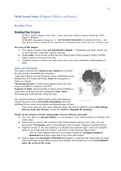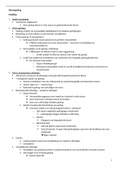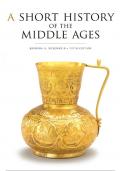Samenvatting
Summary Politics: Africa Week Seven Reading and Lecture Notes: Religion, Politics, and Society
- Vak
- Politics: Africa
- Instelling
- Universiteit Leiden (UL)
*** not sure how important these readings are as exam content in my opinion, but perhaps a nice background. A Summary of Heather Deegan, Africa Today: Culture, Economics, Religion, Security (Routledge, 2009), chapter 2 “Religion”. J. Kwabena Asamoah-Gyadu, “Pentecostalism and the T...
[Meer zien]







